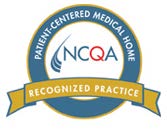What is a Patient-Centered Medical Home?
A patient-centered medical home (PCMH) is a team approach to caring for patients in the primary care setting. Your team may include physicians, nurses, physician assistants, nurse practitioners, pharmacists, dietitians, social workers, health educators and care coordinators. Of course, you and your support person or persons are at the center of your care.
Your patient-centered medical home at Memorial Health University Physicians will:
- Help you manage your healthcare, including chronic conditions such as diabetes.
- Listen to your concerns and answer your health questions.
- Help you coordinate additional services when needed, such as specialists, home healthcare, rehabilitation and community and social services.
- Encourage you to be active in your own healthcare.
What is Level 3 Recognition?

All Memorial Health University Physicians’ (MHUP) primary care practices have been recognized as Level 3 patient-centered medical homes by the National Committee for Quality Assurance (NCQA). This is the highest level of recognition a practice can earn.
To earn recognition, the MHUP primary care practices demonstrated the ability to meet the program’s key elements, which include using evidence-based, patient-centered processes that focus on highly coordinated care and long-term, participative relationships.
NCQA standards align with the joint principles of the patient-centered medical home established with the American College of Physicians, the American Academy of Family Physicians, the American Academy of Pediatrics and the American Osteopathic Association.
What You Can Do
Here are some tips to help you make the most of your appointment at your PCMH:
- Write down the names of your healthcare team members.
- Bring a list of questions for your team. Write down the answers.
- Share your struggles and successes with your health team.
- Bring all of your medications, vitamins and supplements (prescriptions and over-the-counter) with you.
- Bring your list of blood sugar or blood pressure readings and daily weights you have recorded at home.
- Repeat, in your own words, the things you have discussed with your team. If there is something you do not understand, ask for clarification.
- Ask your team how to reach them after hours.
- Register for MyChart, a free, secure online patient portal that allows you to send private messages to your healthcare team 24 hours a day.
- Work with your team to develop your plan of care and follow it to achieve your health goals.
- Tell your team if you are having trouble following your plan of care.